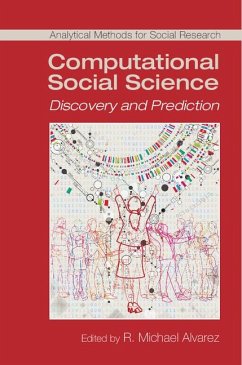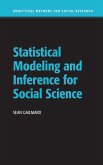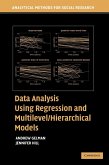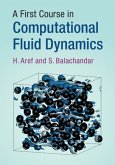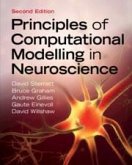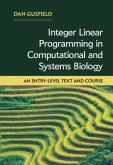Computational Social Science
Herausgeber: Alvarez, R. Michael
22,99 €
inkl. MwSt.
**Unverbindliche Preisempfehlung des Herstellers
Versandfertig in 1-2 Wochen

11 °P sammeln
Computational Social Science
Herausgeber: Alvarez, R. Michael
- Broschiertes Buch
- Merkliste
- Auf die Merkliste
- Bewerten Bewerten
- Teilen
- Produkt teilen
- Produkterinnerung
- Produkterinnerung
This book serves as an introduction to the field of computational social science for academics, students, and practitioners. It will also appeal to data scientists who wish to learn about innovations in the area, in particular those interested in how data analytics is applied to study social behavior.
Andere Kunden interessierten sich auch für
![Statistical Modeling and Inference for Social Science Statistical Modeling and Inference for Social Science]() Sean Gailmard (Berkeley University of California)Statistical Modeling and Inference for Social Science73,99 €
Sean Gailmard (Berkeley University of California)Statistical Modeling and Inference for Social Science73,99 €![Data Analysis Using Regression and Multilevel/Hierarchical Models Data Analysis Using Regression and Multilevel/Hierarchical Models]() Andrew Gelman (New York Columbia University)Data Analysis Using Regression and Multilevel/Hierarchical Models143,99 €
Andrew Gelman (New York Columbia University)Data Analysis Using Regression and Multilevel/Hierarchical Models143,99 €![A First Course in Computational Fluid Dynamics A First Course in Computational Fluid Dynamics]() H. Aref (Virginia Polytechnic Institute and State University)A First Course in Computational Fluid Dynamics66,99 €
H. Aref (Virginia Polytechnic Institute and State University)A First Course in Computational Fluid Dynamics66,99 €![Computational Approaches to the Network Science of Teams Computational Approaches to the Network Science of Teams]() Liangyue LiComputational Approaches to the Network Science of Teams39,99 €
Liangyue LiComputational Approaches to the Network Science of Teams39,99 €![Principles of Computational Modelling in Neuroscience Principles of Computational Modelling in Neuroscience]() David Sterratt (University of Edinburgh)Principles of Computational Modelling in Neuroscience68,99 €
David Sterratt (University of Edinburgh)Principles of Computational Modelling in Neuroscience68,99 €![Integer Linear Programming in Computational and Systems Biology Integer Linear Programming in Computational and Systems Biology]() Dan Gusfield (Davis University of California)Integer Linear Programming in Computational and Systems Biology79,99 €
Dan Gusfield (Davis University of California)Integer Linear Programming in Computational and Systems Biology79,99 €![A First Guide to Computational Modelling in Physics A First Guide to Computational Modelling in Physics]() Pawel Scharoch (Wroclaw University of Science and Technology)A First Guide to Computational Modelling in Physics30,99 €
Pawel Scharoch (Wroclaw University of Science and Technology)A First Guide to Computational Modelling in Physics30,99 €-
-
-
This book serves as an introduction to the field of computational social science for academics, students, and practitioners. It will also appeal to data scientists who wish to learn about innovations in the area, in particular those interested in how data analytics is applied to study social behavior.
Hinweis: Dieser Artikel kann nur an eine deutsche Lieferadresse ausgeliefert werden.
Hinweis: Dieser Artikel kann nur an eine deutsche Lieferadresse ausgeliefert werden.
Produktdetails
- Produktdetails
- Analytical Methods for Social Research
- Verlag: Cambridge University Press
- Seitenzahl: 338
- Erscheinungstermin: 7. Juni 2017
- Englisch
- Abmessung: 229mm x 152mm x 19mm
- Gewicht: 494g
- ISBN-13: 9781107518414
- ISBN-10: 1107518415
- Artikelnr.: 43857277
- Herstellerkennzeichnung
- Libri GmbH
- Europaallee 1
- 36244 Bad Hersfeld
- gpsr@libri.de
- Analytical Methods for Social Research
- Verlag: Cambridge University Press
- Seitenzahl: 338
- Erscheinungstermin: 7. Juni 2017
- Englisch
- Abmessung: 229mm x 152mm x 19mm
- Gewicht: 494g
- ISBN-13: 9781107518414
- ISBN-10: 1107518415
- Artikelnr.: 43857277
- Herstellerkennzeichnung
- Libri GmbH
- Europaallee 1
- 36244 Bad Hersfeld
- gpsr@libri.de
Preface Gary King; Introduction R. Michael Alvarez; Part I. Computation
Social Science Tools: 1. The application of big data in surveys to the
study of public opinion, elections, and representation Christopher Warshaw;
2. Navigating the local modes of big data: the case of topic models
Margaret Roberts, Brandon Stewart and Dustin Tingley; 3. Generating
political event data in near real time: opportunities and challenges John
Beieler, Patrick T. Brandt, Andrew Halterman, Philip A. Schrodt and Erin M.
Simpson; 4. Network structure and social outcomes: network analysis for
social science Betsy Sinclair; 5. Ideological salience in multiple
dimensions Peter Foley; 6. Random forest applied to feature selection in
biomedical research Daniel Conn and Christina Ramirez; Part II. Computation
Social Science Applications: 7. Big data, social media, and protest:
foundations for a research agenda Joshua Tucker, Jonathan Nagler, Megan
Metzger, Pablo Barbera, Duncan Penfold-Brown, John Jost and Richard
Bonneau; 8. Measuring representational style in the House: the Tea Party,
Obama and legislators' changing expressed priorities Justin Grimmer; 9.
Using social marketing and data science to make government smarter Brian
Griepentrog, Sean Marsh, Sidney Carl Turner and Sarah Evans; 10. Using
machine algorithms to detect election fraud Ines Levin, Julia Pomares and
R. Michael Alvarez; 11. Centralized analysis of local data, with dollars
and lives on the line: lessons from the home radon experience Phillip N.
Price and Andrew Gelman; Conclusion. Computational social science: towards
a collaborative future Hanna Wallach.
Social Science Tools: 1. The application of big data in surveys to the
study of public opinion, elections, and representation Christopher Warshaw;
2. Navigating the local modes of big data: the case of topic models
Margaret Roberts, Brandon Stewart and Dustin Tingley; 3. Generating
political event data in near real time: opportunities and challenges John
Beieler, Patrick T. Brandt, Andrew Halterman, Philip A. Schrodt and Erin M.
Simpson; 4. Network structure and social outcomes: network analysis for
social science Betsy Sinclair; 5. Ideological salience in multiple
dimensions Peter Foley; 6. Random forest applied to feature selection in
biomedical research Daniel Conn and Christina Ramirez; Part II. Computation
Social Science Applications: 7. Big data, social media, and protest:
foundations for a research agenda Joshua Tucker, Jonathan Nagler, Megan
Metzger, Pablo Barbera, Duncan Penfold-Brown, John Jost and Richard
Bonneau; 8. Measuring representational style in the House: the Tea Party,
Obama and legislators' changing expressed priorities Justin Grimmer; 9.
Using social marketing and data science to make government smarter Brian
Griepentrog, Sean Marsh, Sidney Carl Turner and Sarah Evans; 10. Using
machine algorithms to detect election fraud Ines Levin, Julia Pomares and
R. Michael Alvarez; 11. Centralized analysis of local data, with dollars
and lives on the line: lessons from the home radon experience Phillip N.
Price and Andrew Gelman; Conclusion. Computational social science: towards
a collaborative future Hanna Wallach.
Preface Gary King; Introduction R. Michael Alvarez; Part I. Computation
Social Science Tools: 1. The application of big data in surveys to the
study of public opinion, elections, and representation Christopher Warshaw;
2. Navigating the local modes of big data: the case of topic models
Margaret Roberts, Brandon Stewart and Dustin Tingley; 3. Generating
political event data in near real time: opportunities and challenges John
Beieler, Patrick T. Brandt, Andrew Halterman, Philip A. Schrodt and Erin M.
Simpson; 4. Network structure and social outcomes: network analysis for
social science Betsy Sinclair; 5. Ideological salience in multiple
dimensions Peter Foley; 6. Random forest applied to feature selection in
biomedical research Daniel Conn and Christina Ramirez; Part II. Computation
Social Science Applications: 7. Big data, social media, and protest:
foundations for a research agenda Joshua Tucker, Jonathan Nagler, Megan
Metzger, Pablo Barbera, Duncan Penfold-Brown, John Jost and Richard
Bonneau; 8. Measuring representational style in the House: the Tea Party,
Obama and legislators' changing expressed priorities Justin Grimmer; 9.
Using social marketing and data science to make government smarter Brian
Griepentrog, Sean Marsh, Sidney Carl Turner and Sarah Evans; 10. Using
machine algorithms to detect election fraud Ines Levin, Julia Pomares and
R. Michael Alvarez; 11. Centralized analysis of local data, with dollars
and lives on the line: lessons from the home radon experience Phillip N.
Price and Andrew Gelman; Conclusion. Computational social science: towards
a collaborative future Hanna Wallach.
Social Science Tools: 1. The application of big data in surveys to the
study of public opinion, elections, and representation Christopher Warshaw;
2. Navigating the local modes of big data: the case of topic models
Margaret Roberts, Brandon Stewart and Dustin Tingley; 3. Generating
political event data in near real time: opportunities and challenges John
Beieler, Patrick T. Brandt, Andrew Halterman, Philip A. Schrodt and Erin M.
Simpson; 4. Network structure and social outcomes: network analysis for
social science Betsy Sinclair; 5. Ideological salience in multiple
dimensions Peter Foley; 6. Random forest applied to feature selection in
biomedical research Daniel Conn and Christina Ramirez; Part II. Computation
Social Science Applications: 7. Big data, social media, and protest:
foundations for a research agenda Joshua Tucker, Jonathan Nagler, Megan
Metzger, Pablo Barbera, Duncan Penfold-Brown, John Jost and Richard
Bonneau; 8. Measuring representational style in the House: the Tea Party,
Obama and legislators' changing expressed priorities Justin Grimmer; 9.
Using social marketing and data science to make government smarter Brian
Griepentrog, Sean Marsh, Sidney Carl Turner and Sarah Evans; 10. Using
machine algorithms to detect election fraud Ines Levin, Julia Pomares and
R. Michael Alvarez; 11. Centralized analysis of local data, with dollars
and lives on the line: lessons from the home radon experience Phillip N.
Price and Andrew Gelman; Conclusion. Computational social science: towards
a collaborative future Hanna Wallach.
